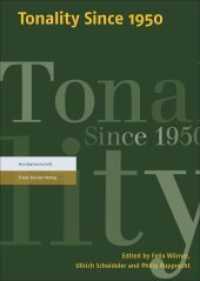- ホーム
- > 洋書
- > 英文書
- > Politics / International Relations
Full Description
Democracy's Meanings challenges conventional wisdom regarding how the public thinks about and evaluates democracy. Mining both political theory and more than 75 years of public opinion data, the book argues that Americans think about democracy in ways that go beyond voting or elected representation. Instead, citizens have rich and substantive views about the material conditions that democracy should produce, which draw from their beliefs about equality, fairness, and justice.
The authors construct a typology of views about democracy. Procedural views of democracy take a minimalistic quality. While voting and fair treatment are important to this vision of democracy, ideas about equality are mostly limited to civil liberties. In contrast, social views of democracy incorporate both civil and economic equality; according to people with these views, democracy ought to meet the basic social and material needs of citizens. Complementing these two groups are moderate and indifferent views about democracy. While moderate views sit somewhere in between procedural and social perspectives regarding the role of democracy in producing social and economic equality, indifferent views of democracy involve disaffection toward it. For a small group of apathetic citizens, democracy is an ambiguous and ill-defined concept.
Contents
List of figures
List of tables
Acknowledgements
Preface
Chapter 1 - Introduction
Chapter 2 - What is democracy? Definitions and scholarly disagreements
Chapter 3 - Polling the public about democracy
Chapter 4 - Creating and validating a typology of democratic meanings
Chapter 5 - The correlates of the democracy typology
Chapter 6 - Compromise and representation within the democracy typology
Chapter 7 - Support for democracy
Chapter 8 - Democratic norms and the democracy typology
Chapter 9 - Conclusion
Appendix - Technical details and supplementary analysis
References







